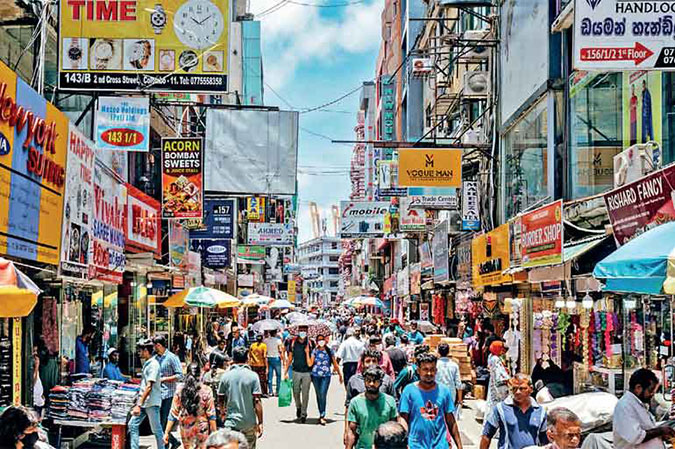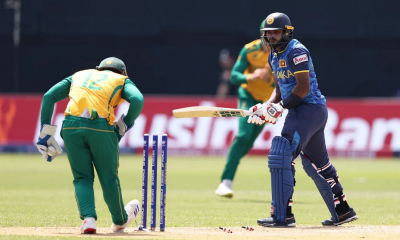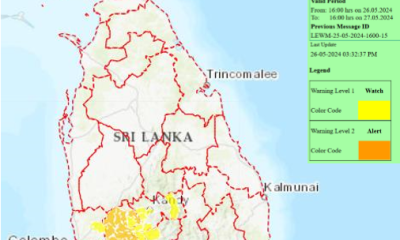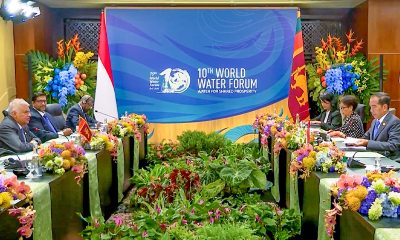Features
Sri Lanka’s Crisis – The Citizen Factor

Sri Lanka’s crisis is the outcome of unsustainable policies, that pandered to the unrealistic expectations of an entitled citizenry, rich and poor alike.
Anila Dias Bandaranaike, Ph. D.
Background
A year ago, Sri Lanka was in dire crisis. The government had no money and the country had no foreign reserves. The country was without essential medicines, staple foods, transport fuel, cooking gas, electricity and fertiliser. Consequently, livelihoods were lost. Yet, the majority of Sri Lanka’s elected representatives, the Executive and 225-strong Legislature, seemed impervious to the crisis.
Eventually, the efforts of a peaceful people’s “Aragalaya”, supported by an entire population, rid the country of an elected President, Prime Minister and Finance Minister, a Central Bank Governor and a Secretary to the Treasury, whose policies had sent the country reeling into the worst economic crisis of independent Sri Lanka. Sadly, that magnificent effort was hijacked by violent elements, who used arson and terror to reduce the country to near anarchy for their own devious ends.
That is now water under the bridge. A year later, Sri Lanka is limping back to some semblance of normalcy, under the stewardship of a President who did not have citizens’ votes to enter Parliament in the last election. An experienced politician, he is effectively there by default, having been in the right place at the right time, by taking on a premiership which others avoided.
Many people now opine that he is the best option for the country at this time. And so, he shines in the mud of 226 representatives the people themselves elected, but did not hold accountable. Meanwhile, the underlying structural crises in several areas – food security, national debt, public finance, state services, labour market – and corruption remain.
Who is Responsible for the Crisis?
So, whom do we blame? Blaming others is easiest.
Some say “the Rajapaksas”. But they, and their team, were merely a politically savvy family, self-serving to the end, with neither acumen nor ability to steer the country forward. Their only objective was to further their own ambitions for money, power and position, which they did, for a while, with unimaginable success.
Some go back in time and say “that old fox, JRJ”, who infamously created an Executive Presidency and an electoral system based on District proportional representation. Today, we face the adverse outcomes of 40 years of an all-powerful presidency in incompetent or unprincipled hands, and of electorates too large to hold Members of Parliament accountable to their voters.
Neither JRJ nor the Rajapaksas could have wreaked such havoc without an entitled citizenry with unrealistic expectations, who relied heavily on unsustainable policies and political patronage, rather than their own efforts, for advancement. So, let us turn the spotlight on ourselves, Sri Lanka’s citizens.
Entitled Citizens and Unrealistic Expectations
Most citizens, rich or poor, educated or not, balk at paying taxes. But their expectations of governments are four-fold.First, expectations of free state services (education, health). Second, expectations of state handouts ranging from under-priced utilities (electricity, water, fuel, cooking gas) to subsidies for consumption (bread, transport) and business (fertiliser, plantation crops).
Third, expectations of random low interest loans and tax breaks (tourism, manufacturing, agriculture, film industry). Citizens expect governments to magically finance these. Do they know that taxes or loans finance government expenses?
Fourth, expectations of political patronage to provide jobs, school admissions, job transfers or promotions and to facilitate business contracts, unrelated to the abilities of recipients. While politicians expect and citizens provide returns for such favours, Sri Lanka can never become a merit-based system of professionals.
A Collapsed System, Entitled Politicians and the Reality Gap
Our system of government has collapsed. We have forgotten that elected representatives exist to serve the people’s needs. Politicians thrive at marriages, funerals and almsgivings. “Selfies” taken with political leaders flood the internet. Instead of holding politicians accountable for discharging their responsibilities, citizens pay them homage, thereby creating an entitled breed.
This attitude allows politicians to act above the rules applicable to citizens – to halt traffic and exceed speed limits, so they can proceed uninterrupted on busy roads; to break queues for items in short supply, a separate system to obtain scarce fuel – only because citizens allow it. Hence, most politicians, in government or opposition, become accustomed to such acquiescence. Many come to expect it and the ensuing perks.
How many elected politicians pay for personal expenses in a store, restaurant, hotel or hospital? Consequently, they have little experience of the day-to-day life citizens face – traffic jams, transport delays, queues, finding essentials in short supply, paying for family treats outside the home. So how can they be expected to understand people’s needs? They become increasingly isolated from the ground reality, relying heavily on those who have their ear.
In times gone by, apolitical public officials with experience and acumen advised their political leaders. They provided constructive criticism. Leaders listened. Today, in a highly politicised service, blind loyalty takes priority over ability. With criticism perceived as disloyal, senior public officials remain fearfully silent. Instead, the ears of the leaders are hijacked by others, the “wannabees’, with their own agendas for position, power or business advantage. Therein lies the dilemma.
Dependence on Government and Unsustainable Policies
At independence, Sri Lanka had the advantages of geographical location, natural resources and high human development indicators. Yet, with unrealistic dependence on government, in time the state sector ballooned. Today, overstaffed state institutions with overlapping functions abound, with no plan for rationalisation. In 70 years, Sri Lanka fell far behind, the outcome of mismanagement and low productivity.
More than 65 state institutions, funded by taxes and loans, “support” agriculture. Yet, in pre- COVID 2019, 2.2 million people were food insecure. Today, agriculture absorbs 28% of workers, but contributes only 8% of economic output, with labour productivity well below other sectors. Until the crisis, village farmers and highly influential plantation companies, alike, relied on government subsidies for fertiliser, replanting and transplanting. Despite so much “support”, farmers still depend on imports and the Department of Agriculture for seeds to grow vegetables, unable to produce enough on their own.
Thirty years ago, the doyens of corporate management took over 23 regional plantation companies holding tremendous land assets. Potential for long-term investment – in higher value-added tea and rubber, high-end fruit and vegetable cultivation and horticulture, forestry, high-end tourism, hydro and dendro power – was endless. Yet, who used such opportunities? Many continued, as from British times, to produce primary products from plantation crops for export. When international prices were high, they paid good dividends and bought company vehicles, and when low, they requested government handouts.
Sri Lanka opened manufacturing and export processing zones in 1977 for foreign direct investment (FDI). Non-sector-specific, long-sighted policies for essential infrastructure, simplified procedures and a stable socio-political environment, would have encouraged long-term FDI with technology transfer.
But, influenced by self-interest lobby groups, short-sighted policies for tax holidays and low tax rates for specific sectors encouraged mainly short-term FDI, which terminated with the tax holidays. Consequently, many countries in the region have overtaken Sri Lanka in attracting FDI. Meanwhile, despite “support” from GCEC (now BOI), EDB and several other state institutions, procedures remain cumbersome. Exports still depend on handouts like GSP + to be viable.
In Tourism, the internet provides instantaneous information to a new generation of clientele, who prioritise unique, new travel experiences and environmental concerns. Catering to such demand are highly successful tourism ventures in the SME sector, that preserve the environment and show-case Sri Lanka’s cuisine and incredible biodiversity, maintaining low overheads. Yet, old-school corporates and “new money” investing in low-end tourism, have greater negotiating access and influence over state institutions which “support” tourism, rather than these SMEs.
These corporates own large resorts with high overheads around the country. Those were successful with global travellers of 40 years ago. Many such resorts cater to two-week budget holiday-makers with limited disposable income, making their profits on tourist volumes, rather than high value-addition. They pay dividends in good times and ask for handouts in bad! At a public discussion on the disastrous 2020 Budget, the Chairperson of The Hotels Association of Sri Lanka, first commended “business incentives”, rather than handouts, given in the Budget, and, in the next breath, asked for a government grant or interest-free loan to pay their hotel employees during COVID – a handout!!
The concept of risk versus return is unknown in Sri Lanka. The philosophy has been to spend lavishly in good times and get state bailouts during bad. Rather than raising productivity, wages and professionalism, we continue to expect government favours and handouts to succeed. Some, who believe that “who they know is more important than what they know”, are ready to stroke egos to push personal agendas. Those with integrity and no personal agendas, remain silent. Perhaps they know, from experience, that constructive criticism will not be heeded, in this toxic environment. Without their voices, like those before him, our leader becomes increasingly isolated from the ground reality.
Questions
So, what must be done?
How do those with the acumen and integrity, get leaders to heed constructive criticism?
How can public officials attain, and be made responsible and accountable for key positions, on merit?
How do businesses and citizens learn that a country cannot develop on handouts and personal favours?
How do businesses and citizens learn that taxes are needed to finance state services?
How do politicians learn to serve citizens, not themselves?
How can citizens learn to make politicians accountable, not entitled?
Sri Lanka has only temporarily and superficially overcome the crisis we suffered. We need to address the above, to permanently rise from it.
The author is a former Assistant Governor and Director of Statistics of the Central Bank of Sri Lanka. She also served as a member of the Independent Delimitation Commission of Sri Lanka.
Features
The heart-friendly health minister

by Dr Gotabhya Ranasinghe
Senior Consultant Cardiologist
National Hospital Sri Lanka
When we sought a meeting with Hon Dr. Ramesh Pathirana, Minister of Health, he graciously cleared his busy schedule to accommodate us. Renowned for his attentive listening and deep understanding, Minister Pathirana is dedicated to advancing the health sector. His openness and transparency exemplify the qualities of an exemplary politician and minister.
Dr. Palitha Mahipala, the current Health Secretary, demonstrates both commendable enthusiasm and unwavering support. This combination of attributes makes him a highly compatible colleague for the esteemed Minister of Health.
Our discussion centered on a project that has been in the works for the past 30 years, one that no other minister had managed to advance.
Minister Pathirana, however, recognized the project’s significance and its potential to revolutionize care for heart patients.
The project involves the construction of a state-of-the-art facility at the premises of the National Hospital Colombo. The project’s location within the premises of the National Hospital underscores its importance and relevance to the healthcare infrastructure of the nation.
This facility will include a cardiology building and a tertiary care center, equipped with the latest technology to handle and treat all types of heart-related conditions and surgeries.
Securing funding was a major milestone for this initiative. Minister Pathirana successfully obtained approval for a $40 billion loan from the Asian Development Bank. With the funding in place, the foundation stone is scheduled to be laid in September this year, and construction will begin in January 2025.
This project guarantees a consistent and uninterrupted supply of stents and related medications for heart patients. As a result, patients will have timely access to essential medical supplies during their treatment and recovery. By securing these critical resources, the project aims to enhance patient outcomes, minimize treatment delays, and maintain the highest standards of cardiac care.
Upon its fruition, this monumental building will serve as a beacon of hope and healing, symbolizing the unwavering dedication to improving patient outcomes and fostering a healthier society.We anticipate a future marked by significant progress and positive outcomes in Sri Lanka’s cardiovascular treatment landscape within the foreseeable timeframe.
Features
A LOVING TRIBUTE TO JESUIT FR. ALOYSIUS PIERIS ON HIS 90th BIRTHDAY

by Fr. Emmanuel Fernando, OMI
Jesuit Fr. Aloysius Pieris (affectionately called Fr. Aloy) celebrated his 90th birthday on April 9, 2024 and I, as the editor of our Oblate Journal, THE MISSIONARY OBLATE had gone to press by that time. Immediately I decided to publish an article, appreciating the untiring selfless services he continues to offer for inter-Faith dialogue, the renewal of the Catholic Church, his concern for the poor and the suffering Sri Lankan masses and to me, the present writer.
It was in 1988, when I was appointed Director of the Oblate Scholastics at Ampitiya by the then Oblate Provincial Fr. Anselm Silva, that I came to know Fr. Aloy more closely. Knowing well his expertise in matters spiritual, theological, Indological and pastoral, and with the collaborative spirit of my companion-formators, our Oblate Scholastics were sent to Tulana, the Research and Encounter Centre, Kelaniya, of which he is the Founder-Director, for ‘exposure-programmes’ on matters spiritual, biblical, theological and pastoral. Some of these dimensions according to my view and that of my companion-formators, were not available at the National Seminary, Ampitiya.
Ever since that time, our Oblate formators/ accompaniers at the Oblate Scholasticate, Ampitiya , have continued to send our Oblate Scholastics to Tulana Centre for deepening their insights and convictions regarding matters needed to serve the people in today’s context. Fr. Aloy also had tried very enthusiastically with the Oblate team headed by Frs. Oswald Firth and Clement Waidyasekara to begin a Theologate, directed by the Religious Congregations in Sri Lanka, for the contextual formation/ accompaniment of their members. It should very well be a desired goal of the Leaders / Provincials of the Religious Congregations.
Besides being a formator/accompanier at the Oblate Scholasticate, I was entrusted also with the task of editing and publishing our Oblate journal, ‘The Missionary Oblate’. To maintain the quality of the journal I continue to depend on Fr. Aloy for his thought-provoking and stimulating articles on Biblical Spirituality, Biblical Theology and Ecclesiology. I am very grateful to him for his generous assistance. Of late, his writings on renewal of the Church, initiated by Pope St. John XX111 and continued by Pope Francis through the Synodal path, published in our Oblate journal, enable our readers to focus their attention also on the needed renewal in the Catholic Church in Sri Lanka. Fr. Aloy appreciated very much the Synodal path adopted by the Jesuit Pope Francis for the renewal of the Church, rooted very much on prayerful discernment. In my Religious and presbyteral life, Fr.Aloy continues to be my spiritual animator / guide and ongoing formator / acccompanier.
Fr. Aloysius Pieris, BA Hons (Lond), LPh (SHC, India), STL (PFT, Naples), PhD (SLU/VC), ThD (Tilburg), D.Ltt (KU), has been one of the eminent Asian theologians well recognized internationally and one who has lectured and held visiting chairs in many universities both in the West and in the East. Many members of Religious Congregations from Asian countries have benefited from his lectures and guidance in the East Asian Pastoral Institute (EAPI) in Manila, Philippines. He had been a Theologian consulted by the Federation of Asian Bishops’ Conferences for many years. During his professorship at the Gregorian University in Rome, he was called to be a member of a special group of advisers on other religions consulted by Pope Paul VI.
Fr. Aloy is the author of more than 30 books and well over 500 Research Papers. Some of his books and articles have been translated and published in several countries. Among those books, one can find the following: 1) The Genesis of an Asian Theology of Liberation (An Autobiographical Excursus on the Art of Theologising in Asia, 2) An Asian Theology of Liberation, 3) Providential Timeliness of Vatican 11 (a long-overdue halt to a scandalous millennium, 4) Give Vatican 11 a chance, 5) Leadership in the Church, 6) Relishing our faith in working for justice (Themes for study and discussion), 7) A Message meant mainly, not exclusively for Jesuits (Background information necessary for helping Francis renew the Church), 8) Lent in Lanka (Reflections and Resolutions, 9) Love meets wisdom (A Christian Experience of Buddhism, 10) Fire and Water 11) God’s Reign for God’s poor, 12) Our Unhiddden Agenda (How we Jesuits work, pray and form our men). He is also the Editor of two journals, Vagdevi, Journal of Religious Reflection and Dialogue, New Series.
Fr. Aloy has a BA in Pali and Sanskrit from the University of London and a Ph.D in Buddhist Philosophy from the University of Sri Lankan, Vidyodaya Campus. On Nov. 23, 2019, he was awarded the prestigious honorary Doctorate of Literature (D.Litt) by the Chancellor of the University of Kelaniya, the Most Venerable Welamitiyawe Dharmakirthi Sri Kusala Dhamma Thera.
Fr. Aloy continues to be a promoter of Gospel values and virtues. Justice as a constitutive dimension of love and social concern for the downtrodden masses are very much noted in his life and work. He had very much appreciated the commitment of the late Fr. Joseph (Joe) Fernando, the National Director of the Social and Economic Centre (SEDEC) for the poor.
In Sri Lanka, a few religious Congregations – the Good Shepherd Sisters, the Christian Brothers, the Marist Brothers and the Oblates – have invited him to animate their members especially during their Provincial Congresses, Chapters and International Conferences. The mainline Christian Churches also have sought his advice and followed his seminars. I, for one, regret very much, that the Sri Lankan authorities of the Catholic Church –today’s Hierarchy—- have not sought Fr.
Aloy’s expertise for the renewal of the Catholic Church in Sri Lanka and thus have not benefited from the immense store of wisdom and insight that he can offer to our local Church while the Sri Lankan bishops who governed the Catholic church in the immediate aftermath of the Second Vatican Council (Edmund Fernando OMI, Anthony de Saram, Leo Nanayakkara OSB, Frank Marcus Fernando, Paul Perera,) visited him and consulted him on many matters. Among the Tamil Bishops, Bishop Rayappu Joseph was keeping close contact with him and Bishop J. Deogupillai hosted him and his team visiting him after the horrible Black July massacre of Tamils.
Features
A fairy tale, success or debacle

Sri Lanka-Singapore Free Trade Agreement
By Gomi Senadhira
senadhiragomi@gmail.com
“You might tell fairy tales, but the progress of a country cannot be achieved through such narratives. A country cannot be developed by making false promises. The country moved backward because of the electoral promises made by political parties throughout time. We have witnessed that the ultimate result of this is the country becoming bankrupt. Unfortunately, many segments of the population have not come to realize this yet.” – President Ranil Wickremesinghe, 2024 Budget speech
Any Sri Lankan would agree with the above words of President Wickremesinghe on the false promises our politicians and officials make and the fairy tales they narrate which bankrupted this country. So, to understand this, let’s look at one such fairy tale with lots of false promises; Ranil Wickremesinghe’s greatest achievement in the area of international trade and investment promotion during the Yahapalana period, Sri Lanka-Singapore Free Trade Agreement (SLSFTA).
It is appropriate and timely to do it now as Finance Minister Wickremesinghe has just presented to parliament a bill on the National Policy on Economic Transformation which includes the establishment of an Office for International Trade and the Sri Lanka Institute of Economics and International Trade.
Was SLSFTA a “Cleverly negotiated Free Trade Agreement” as stated by the (former) Minister of Development Strategies and International Trade Malik Samarawickrama during the Parliamentary Debate on the SLSFTA in July 2018, or a colossal blunder covered up with lies, false promises, and fairy tales? After SLSFTA was signed there were a number of fairy tales published on this agreement by the Ministry of Development Strategies and International, Institute of Policy Studies, and others.
However, for this article, I would like to limit my comments to the speech by Minister Samarawickrama during the Parliamentary Debate, and the two most important areas in the agreement which were covered up with lies, fairy tales, and false promises, namely: revenue loss for Sri Lanka and Investment from Singapore. On the other important area, “Waste products dumping” I do not want to comment here as I have written extensively on the issue.
1. The revenue loss
During the Parliamentary Debate in July 2018, Minister Samarawickrama stated “…. let me reiterate that this FTA with Singapore has been very cleverly negotiated by us…. The liberalisation programme under this FTA has been carefully designed to have the least impact on domestic industry and revenue collection. We have included all revenue sensitive items in the negative list of items which will not be subject to removal of tariff. Therefore, 97.8% revenue from Customs duty is protected. Our tariff liberalisation will take place over a period of 12-15 years! In fact, the revenue earned through tariffs on goods imported from Singapore last year was Rs. 35 billion.
The revenue loss for over the next 15 years due to the FTA is only Rs. 733 million– which when annualised, on average, is just Rs. 51 million. That is just 0.14% per year! So anyone who claims the Singapore FTA causes revenue loss to the Government cannot do basic arithmetic! Mr. Speaker, in conclusion, I call on my fellow members of this House – don’t mislead the public with baseless criticism that is not grounded in facts. Don’t look at petty politics and use these issues for your own political survival.”
I was surprised to read the minister’s speech because an article published in January 2018 in “The Straits Times“, based on information released by the Singaporean Negotiators stated, “…. With the FTA, tariff savings for Singapore exports are estimated to hit $10 million annually“.
As the annual tariff savings (that is the revenue loss for Sri Lanka) calculated by the Singaporean Negotiators, Singaporean $ 10 million (Sri Lankan rupees 1,200 million in 2018) was way above the rupees’ 733 million revenue loss for 15 years estimated by the Sri Lankan negotiators, it was clear to any observer that one of the parties to the agreement had not done the basic arithmetic!
Six years later, according to a report published by “The Morning” newspaper, speaking at the Committee on Public Finance (COPF) on 7th May 2024, Mr Samarawickrama’s chief trade negotiator K.J. Weerasinghehad had admitted “…. that forecasted revenue loss for the Government of Sri Lanka through the Singapore FTA is Rs. 450 million in 2023 and Rs. 1.3 billion in 2024.”
If these numbers are correct, as tariff liberalisation under the SLSFTA has just started, we will pass Rs 2 billion very soon. Then, the question is how Sri Lanka’s trade negotiators made such a colossal blunder. Didn’t they do their basic arithmetic? If they didn’t know how to do basic arithmetic they should have at least done their basic readings. For example, the headline of the article published in The Straits Times in January 2018 was “Singapore, Sri Lanka sign FTA, annual savings of $10m expected”.
Anyway, as Sri Lanka’s chief negotiator reiterated at the COPF meeting that “…. since 99% of the tariffs in Singapore have zero rates of duty, Sri Lanka has agreed on 80% tariff liberalisation over a period of 15 years while expecting Singapore investments to address the imbalance in trade,” let’s turn towards investment.
Investment from Singapore
In July 2018, speaking during the Parliamentary Debate on the FTA this is what Minister Malik Samarawickrama stated on investment from Singapore, “Already, thanks to this FTA, in just the past two-and-a-half months since the agreement came into effect we have received a proposal from Singapore for investment amounting to $ 14.8 billion in an oil refinery for export of petroleum products. In addition, we have proposals for a steel manufacturing plant for exports ($ 1 billion investment), flour milling plant ($ 50 million), sugar refinery ($ 200 million). This adds up to more than $ 16.05 billion in the pipeline on these projects alone.
And all of these projects will create thousands of more jobs for our people. In principle approval has already been granted by the BOI and the investors are awaiting the release of land the environmental approvals to commence the project.
I request the Opposition and those with vested interests to change their narrow-minded thinking and join us to develop our country. We must always look at what is best for the whole community, not just the few who may oppose. We owe it to our people to courageously take decisions that will change their lives for the better.”
According to the media report I quoted earlier, speaking at the Committee on Public Finance (COPF) Chief Negotiator Weerasinghe has admitted that Sri Lanka was not happy with overall Singapore investments that have come in the past few years in return for the trade liberalisation under the Singapore-Sri Lanka Free Trade Agreement. He has added that between 2021 and 2023 the total investment from Singapore had been around $162 million!
What happened to those projects worth $16 billion negotiated, thanks to the SLSFTA, in just the two-and-a-half months after the agreement came into effect and approved by the BOI? I do not know about the steel manufacturing plant for exports ($ 1 billion investment), flour milling plant ($ 50 million) and sugar refinery ($ 200 million).
However, story of the multibillion-dollar investment in the Petroleum Refinery unfolded in a manner that would qualify it as the best fairy tale with false promises presented by our politicians and the officials, prior to 2019 elections.
Though many Sri Lankans got to know, through the media which repeatedly highlighted a plethora of issues surrounding the project and the questionable credentials of the Singaporean investor, the construction work on the Mirrijiwela Oil Refinery along with the cement factory began on the24th of March 2019 with a bang and Minister Ranil Wickremesinghe and his ministers along with the foreign and local dignitaries laid the foundation stones.
That was few months before the 2019 Presidential elections. Inaugurating the construction work Prime Minister Ranil Wickremesinghe said the projects will create thousands of job opportunities in the area and surrounding districts.
The oil refinery, which was to be built over 200 acres of land, with the capacity to refine 200,000 barrels of crude oil per day, was to generate US$7 billion of exports and create 1,500 direct and 3,000 indirect jobs. The construction of the refinery was to be completed in 44 months. Four years later, in August 2023 the Cabinet of Ministers approved the proposal presented by President Ranil Wickremesinghe to cancel the agreement with the investors of the refinery as the project has not been implemented! Can they explain to the country how much money was wasted to produce that fairy tale?
It is obvious that the President, ministers, and officials had made huge blunders and had deliberately misled the public and the parliament on the revenue loss and potential investment from SLSFTA with fairy tales and false promises.
As the president himself said, a country cannot be developed by making false promises or with fairy tales and these false promises and fairy tales had bankrupted the country. “Unfortunately, many segments of the population have not come to realize this yet”.
(The writer, a specialist and an activist on trade and development issues . )
























